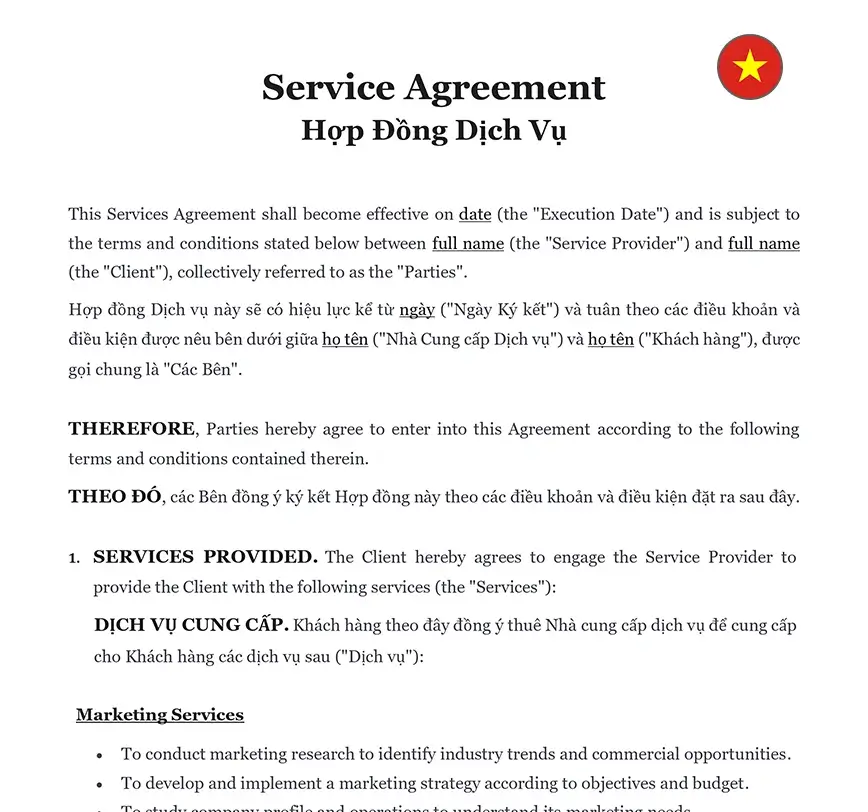Ready to use legal template
Drafted by experienced lawyers
Vietnamese-English translation
Ready to use legal template
Drafted by lawyers
Vietnamese-English translation
Home › Business contracts › Service agreement
Learn more about Service Agreement in Vietnam
Our Service Agreement template is a legally binding contract outlining the terms and conditions between a service provider and a client. Our document is meticulously drafted by experienced lawyers to ensure compliance with Vietnamese laws and regulations. It is presented in an easy-to-edit Word format, allowing you to customize it to suit your specific needs and requirements. With our Service Agreement, you can confidently establish clear expectations and protect your interests when engaging in service-based transactions in Vietnam.
Table of contents
-
What is a Service Agreement?
-
What is included in a Service Agreement?
-
Why is a Service Agreement important in Vietnam?
-
How is a Service Agreement different from a contract?
-
Are there any specific laws or regulations in Vietnam?
-
Are there any limitations on the types of services that can be covered?
-
Are there different types of Service Agreements in Vietnam?
-
What happens if there is a breach of a Service Agreement?
-
Can a Service Agreement be modified or amended in Vietnam?
What is a Service Agreement?
A Service Agreement is a formal contract between a service provider and a client that outlines the terms and conditions of the services to be provided. It serves as a roadmap for the relationship, detailing the scope of work, timelines, payment terms, and any other relevant provisions. By defining these aspects upfront, a Service Agreement helps to manage expectations and prevent misunderstandings between the parties. It also provides a legal framework for resolving disputes that may arise during the course of the agreement.
In addition to protecting the interests of both parties, a Service Agreement can also help to establish a sense of professionalism and credibility. It demonstrates that the service provider is serious about their work and is committed to delivering high-quality services. For clients, having a Service Agreement in place provides peace of mind, knowing that the terms of the agreement are legally enforceable. A well-drafted Service Agreement is essential for ensuring a smooth and successful service engagement.
What is included in a Service Agreement?
A Service Agreement typically includes several key components to ensure that both parties understand their rights and obligations. These components may vary depending on the nature of the services being provided and the preferences of the parties involved. However, some common elements found in many Service Agreements include:
Parties Involved:
Identifies the service provider and the client, including their contact information and any other relevant details.
Scope of Services:
Describes the specific services to be provided, including any limitations or exclusions.
Payment Terms:
Outlines the payment structure, including the total cost of services, payment schedule, and any additional fees or expenses.
Term and Termination:
Specifies the duration of the agreement and the conditions under which it can be terminated by either party.
Intellectual Property Rights:
Addresses ownership of any intellectual property created or used in connection with the services.
Confidentiality:
Includes provisions to protect confidential information shared between the parties.
Indemnification:
Specifies the extent to which each party is responsible for any damages or losses that may occur during the agreement.
Dispute Resolution:
Outlines the process for resolving any disputes that may arise between the parties.
Why is a Service Agreement important in Vietnam?
A Service Agreement is crucial in Vietnam for several reasons:
1. Legal Compliance: It ensures that both parties adhere to Vietnamese laws and regulations, reducing the risk of legal disputes and penalties.
2. Clear Expectations: The agreement clearly defines the roles, responsibilities, and expectations of both the service provider and the client, preventing misunderstandings and ensuring smooth collaboration.
3. Protection of Interests: It safeguards the interests of both parties by outlining the terms of service, payment, confidentiality, and dispute resolution, providing a legal framework for addressing any issues that may arise.
4. Professionalism: Having a formal agreement enhances the professionalism of the business relationship, fostering trust and confidence between the parties involved.
5. Dispute Resolution: The agreement includes mechanisms for resolving disputes, which can save time and resources compared to litigation.
6. Documentation: It provides a written record of the agreed terms and conditions, which is essential for accountability and reference throughout the duration of the service relationship.
How is a Service Agreement different from a contract?
A Service Agreement is a type of contract, but the term “contract” is a broader legal concept that encompasses a wide range of agreements. The main difference between a Service Agreement and other types of contracts lies in the specific nature of the agreement and the services being provided.
1. A Service Agreement
A Service Agreement is a contract that specifically governs the provision of services from one party to another. It outlines the scope of services, the terms of payment, and other relevant details specific to the service engagement. Service Agreements are commonly used in industries such as consulting, freelancing, and professional services.
2. A contract
A contract can refer to any legally binding agreement between two or more parties. Contracts can cover a wide range of transactions and relationships, including the sale of goods, the lease of property, employment agreements, and more. Unlike a Service Agreement, which is specific to services, a contract can encompass a broader scope of transactions and obligations.
Are there any specific laws or regulations in Vietnam?
Yes, Vietnam has specific laws and regulations that govern Service Agreements and other types of contracts. The primary legal framework for contracts in Vietnam is the Civil Code, which sets out the general principles and rules governing contracts. Additionally, there are specific laws and regulations that may apply depending on the nature of the services being provided and the industries involved.
For example, in the construction industry, there are specific regulations related to construction contracts and service agreements. The Law on Construction sets out the requirements for construction contracts, including licensing requirements, project management, and dispute resolution mechanisms.
In the healthcare industry, there are regulations related to service agreements between healthcare providers and patients. The Law on Medical Examination and Treatment sets out the rights and responsibilities of healthcare providers and patients, including the requirements for obtaining informed consent and the obligations of healthcare providers to provide quality care.
Overall, it is important to be aware of the specific laws and regulations that may apply to your particular industry or situation when drafting a Service Agreement in Vietnam. This can help to ensure that your agreement is legally enforceable and complies with all applicable requirements.
- Remarks:
In Vietnam, specific laws and regulations govern Service Agreements to ensure they comply with legal standards. These regulations are often outlined by the Ministry of Industry and Trade (MOIT). For comprehensive and detailed information about these regulations, you can visit the official web portal of the Ministry of Industry and Trade
Are there any limitations on the types of services that can be covered?
Yes, there can be limitations on the types of services that can be covered in a Service Agreement, which are often influenced by legal, regulatory, and practical considerations. Here are some common limitations:
Legal Restrictions: Certain services may be subject to specific regulations or prohibitions under local, national, or international law. For instance, some countries have restrictions on services related to gambling, certain financial services, or healthcare without proper licensing.
Licensing and Permits: Some services require specific licenses or permits to be legally provided. If the service provider lacks the necessary credentials, they cannot legally offer those services.
Regulatory Compliance: Services in highly regulated industries, such as finance, healthcare, and legal services, must comply with industry-specific regulations. Non-compliance can render a Service Agreement invalid or expose parties to legal liabilities.
Professional Standards: Certain professional services (e.g., legal, medical, engineering) may require the service provider to adhere to professional standards and ethics. A Service Agreement cannot legitimize services provided by individuals or entities not meeting these standards.
Scope of Services: The Service Agreement should clearly define the scope of services to avoid ambiguities. Services beyond the agreed scope are typically not covered unless an amendment to the agreement is made.
Ethical and Moral Considerations: Services that involve unethical or morally questionable activities, even if legal, might not be covered due to reputational risks or internal policies of the involved parties.
Jurisdictional Limitations: The enforceability of a Service Agreement can be limited by jurisdictional boundaries. Services provided across different jurisdictions may require additional considerations to ensure compliance with all relevant laws.
Are there different types of Service Agreements in Vietnam?
Yes, there are different types of Service Agreements in Vietnam, depending on the nature of the services being provided and the specific requirements of the parties involved. Some common types of Service Agreements in Vietnam include:
1. Consulting Service Agreement
This type of agreement is used when a consultant or consulting firm provides services to a client. It outlines the scope of the consulting services, the fees, and any other relevant terms.
2. Freelance Service Agreement
This agreement is used when a freelancer provides services to a client on a project-by-project basis. It typically outlines the scope of work, payment terms, and other relevant details.
3. Maintenance Service Agreement
This agreement is used when a service provider agrees to maintain and repair equipment or machinery for a client. It outlines the terms of the maintenance services, including the schedule and fees.
4. Subscription Service Agreement
This agreement is used when a service provider offers services to a client on a subscription basis. It typically outlines the services included in the subscription, the subscription fees, and any other relevant terms.
What happens if there is a breach of a Service Agreement?
If there is a breach of a Service Agreement in Vietnam, the party that has been harmed by the breach may take legal action to seek remedies. The specific remedies available will depend on the terms of the agreement and the nature of the breach. Some common remedies for breach of contract in Vietnam include:
| ➤ Damages: The party harmed by the breach may be entitled to monetary damages to compensate for any losses suffered as a result of the breach. |
| ➤ Specific Performance: In some cases, the court may order the breaching party to perform their obligations under the agreement. This remedy is typically used when monetary damages are not sufficient to remedy the harm caused by the breach. |
| ➤ Termination: The non-breaching party may have the right to terminate the agreement if the breach is serious enough. Termination typically relieves the non-breaching party of their obligations under the agreement and may entitle them to seek damages for the breach. |
| ➤ Injunction: In cases where the breach threatens to cause irreparable harm, the court may issue an injunction to prevent the breaching party from continuing the harmful behavior. |




